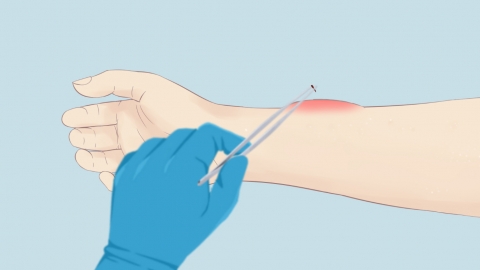How to quickly reduce swelling and relieve pain from a wasp sting
Generally, when stung by a wasp, measures such as ensuring rest, removing the stinger, applying cold compresses, using heat therapy, and taking medications can help reduce swelling and relieve pain quickly. If discomfort occurs, prompt medical attention is recommended. Detailed analysis is as follows:
1. Ensure Rest
Rest can reduce movement in the affected area, thereby decreasing the release of inflammatory mediators and preventing further tissue damage. Try to keep the stung area well rested and avoid strenuous activity, which may accelerate blood circulation and worsen swelling and pain.
2. Remove the Stinger
After being stung by a wasp, it is advisable to check whether the stinger remains in the skin. If found, promptly remove it with tweezers. However, if the embedded stinger is attached to a venom sac, avoid squeezing it with tweezers to prevent further injection of venom and worsening of the reaction. In such cases, seek medical attention immediately.

3. Cold Compress
Within 24 to 48 hours after being stung by a wasp, apply an ice pack or cold towel to the affected area to constrict blood vessels and reduce the release of inflammatory mediators. It is recommended to do this multiple times daily to slow blood circulation, thus alleviating local tissue congestion and edema, and relieving swelling and pain.
4. Heat Compress
More than 48 hours after being stung by a wasp, apply a warm towel to the affected area locally, which can promote local blood circulation and aid in the absorption of bruising and swelling, thereby reducing pain and inflammation.
5. Medication
Under a doctor's guidance, topical medications such as Yunnan Baiyao Spray, Tung Sheng Oil, or Diclofenac Diethylamine Gel can be used. If the pain is severe, oral medications like ibuprofen sustained-release capsules or paracetamol tablets may be taken under medical supervision to alleviate pain and inflammation. It is recommended to follow medical advice when taking medications to minimize gastrointestinal irritation. If adverse reactions occur, seek medical attention promptly to adjust the treatment plan.
In daily life, it is advisable to avoid spicy and irritating foods such as chili peppers, mustard, pepper, and ginger. Limit consumption of greasy foods to prevent interference with wound healing and reduce the risk of infection. Maintaining a healthy lifestyle and balanced nutrient intake is also recommended.








